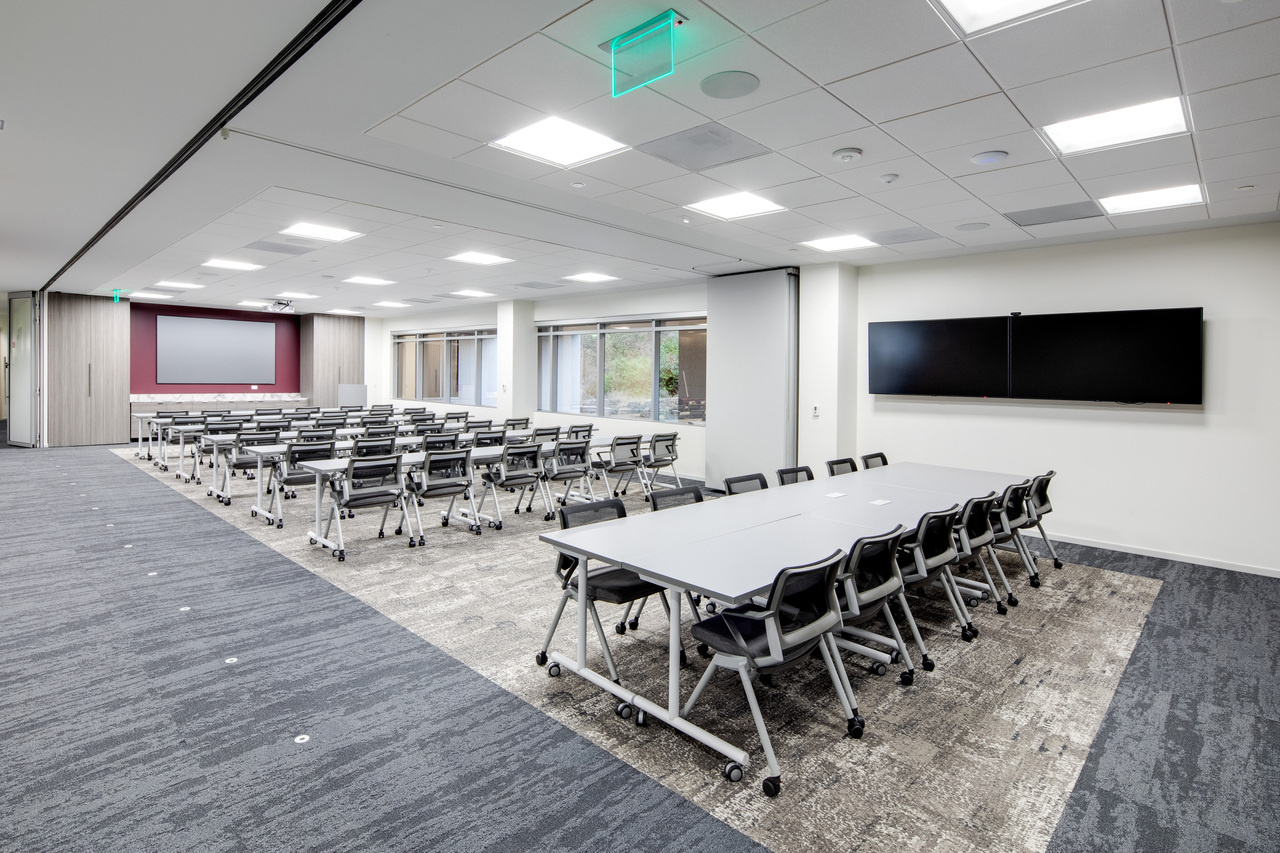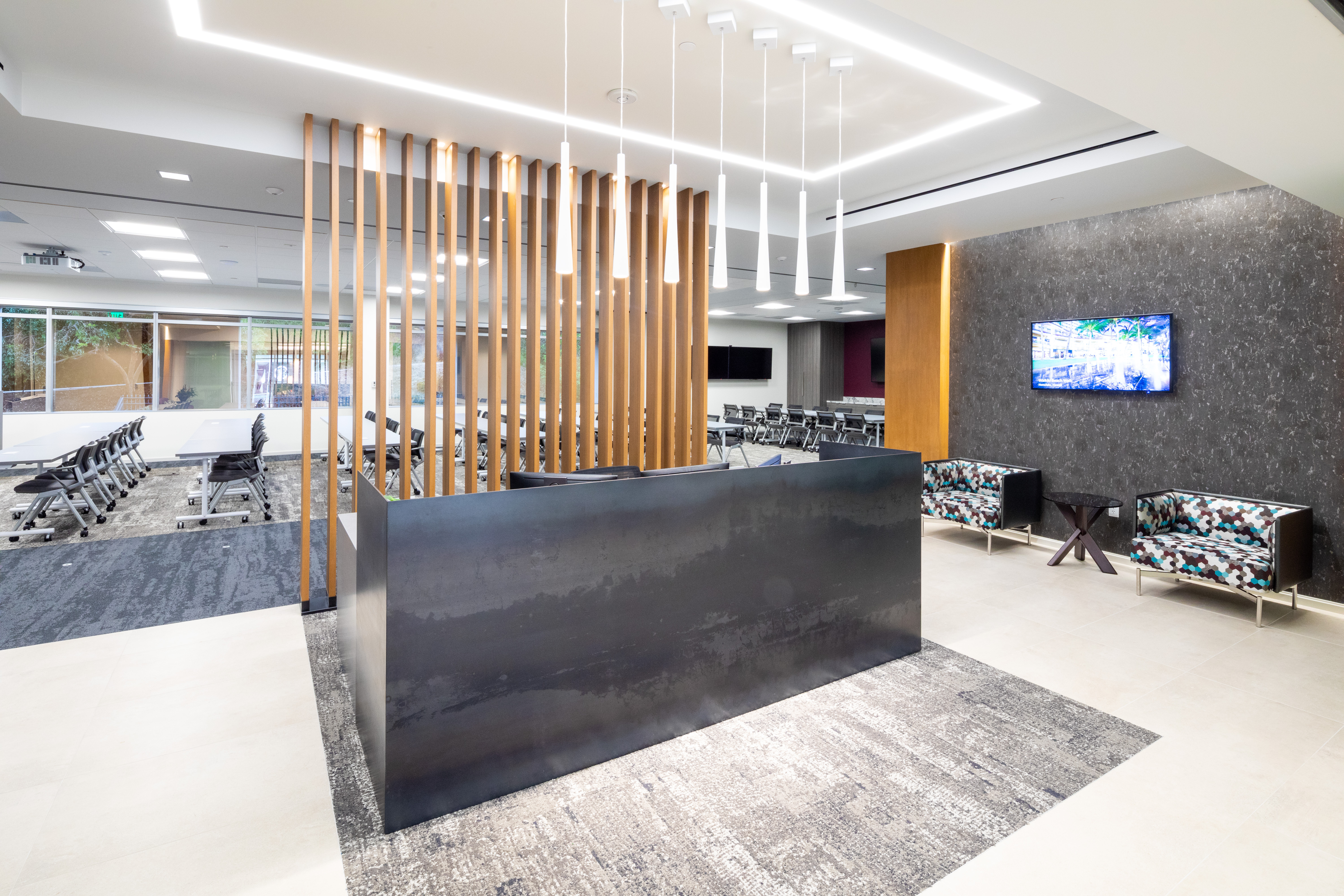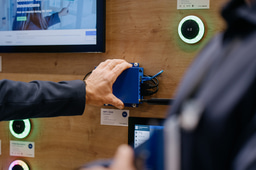Get More from Your Space: 5 AV Tips for Combine/Divide Rooms

Combine/divide, flex space, or multi-purpose conference rooms are meeting spaces designed to be a simple yet powerful solution to maximize space utilization and create an environment that meets a broad range of use cases.
For example, you can create one large space for an all-hands or town-hall-style meeting. Then, you can quickly transform the same space into multiple smaller rooms. Having that flexibility alone can be a game changer, but if you want to unlock the full potential of your combine/divide space, you’ll want to layer in the right AV technology solutions.  To help you understand what’s possible, read on to learn five tips for using AV technology to get the most out of a combine/divide conference space.
To help you understand what’s possible, read on to learn five tips for using AV technology to get the most out of a combine/divide conference space.
Tip #1: Build with the hybrid experience in mind
The first step to delivering seamless communication and collaboration in your flex space is to cater to in-person and remote participants. For example, you could include:
- Intelligent cameras: These AI-powered cameras are active participants in the meeting and automatically frame and track the speaker. This eliminates static shots, leads to smoother transitions, and delivers a better remote experience.
- Beamforming microphones: Add microphones with beamforming technology, such as those available from Biamp, Bose, Shure, and Sennheiser. They use an array of microphones (rather than just one) combined with digital sound processing. The result? You can focus on the sound you want (your speaker) and suppress distracting sound (background chatter or HVAC hum).
Tip #2: Design for flexibility
Approaching your design from a modular perspective will make it easier to adapt the space for different layouts and functions without extensive reconfiguration. Plus, it keeps the space easy for users and adaptable as your needs change. Flexible design can include:
- Multiple configurations: Pre-configure layouts for common use cases, like brainstorming sessions, board meetings, and training sessions. This allows quick and easy transitions between configurations, minimizing downtime and maximizing productivity.
- Movable walls: Choose high-quality, movable walls that are easy to operate, offer a smooth, seamless movement experience, and provide adequate privacy and sound isolation.
- AV integration planning: Collaborate with an expert to integrate your AV technology into all potential room configurations. This ensures optimal performance for users and helps you avoid any compatibility issues down the line.
Tip #3: Optimize audio and video
The likelihood of employees and guests joining meetings from multiple locations makes optimizing audio and video considerations more critical. As such, you’ll want to consider:
- Scalable AV systems: Implement flexible audio and video systems like the certified options from Q-SYS, Biamp, or Crestron. They include defined presets with zoning and tracking capabilities, ensuring clear audio and video coverage throughout the room (regardless of configuration), and ensuring everyone can be seen and heard.
-
Direct View LED: These stunning displays are the new standard and are available in sizes up to 160+ inches from manufacturers like Samsung and LG (talk about the wow factor). If you’re not ready to commit, another option is projectors with retractable screens like those available from Da-Lite.
- Collaboration tools: Integrate interactive displays and whiteboards like T1V or a native Microsoft Teams board like Neat, Yealink, or Surface Hub to enhance collaboration and brainstorming in all meeting sizes. This allows team members to share ideas, annotate content, and work together seamlessly.
As you think about optimizing audio, keep acoustics in mind as well. It’s hard to participate when you can’t hear, and it’s hard to focus when you can overhear the meeting next door. A few well-placed acoustic solutions can make all the difference.
- Soundproofing materials: Utilize soundproofing materials to prevent noise bleed and maintain privacy. This ensures clear communication and focused work, even in close proximity.
- Acoustical treatments: Implement treatments like the Auralex Acoustic Panel on walls and ceilings to optimize sound quality and intelligibility within the space. This reduces echo and reverberation, ensuring everyone can hear and be heard clearly.
- Noise-cancelling technology: Integrate noise-cancelling microphones to improve communication clarity in noisy environments. This allows for focused collaboration even when surrounded by distractions.
Tip #4: Embrace wireless technology
To deliver a great experience for employees and guests, add easy-to-use wireless technology to your combine/divide space, including:
- Wireless microphones: Eliminate cable clutter and provide greater flexibility for room layout changes with solutions like the Microflex Wireless Microphone Systems from Shure.
- Wireless presentation systems: Facilitate seamless content sharing from any device with a wireless presentation system like Barco Clickshare, Mersive Solstice, or Crestron AirMedia. These tools allow presenters to move freely around the room without being tethered to cables.
- Wireless charging solutions: Provide convenient charging options for mobile devices to enhance the user experience and ensure everyone stays connected throughout the day. Your guests will appreciate this detail.
Tip #5: Automate room management
Keep your helpdesk and IT team focused on value-added work by ensuring that your combine/divide space is intuitive and easy to use – even for non-technical employees and guests. For example:
- Control systems: Implement AV control systems such as Qsys or Crestron that allow users to easily manage lighting, temperature, audio, video, and other room settings from a single interface. This simplifies room management and reduces the need for manual intervention.
- Presets and macros: Configure preset room configurations and macros for common tasks. This streamlines room transitions and reduces user error, ensuring a smooth and efficient experience for everyone.
- Scheduling and resource management software: Integrate scheduling software with AV control systems to optimize space usage and prevent conflicts. This ensures rooms are used efficiently and that meetings start on time.
No matter the solution, AV security and privacy are non-negotiable
Any of the AV solutions we’ve covered here will help you get more out of your flex- or multi-purpose conference room. But we’d be remiss if we didn’t also mention the broader issues of security and privacy.
As the largest global systems integrator, we take security measures like data encryption and access control very seriously and only recommend solutions that comply with data privacy regulations.






Please sign in or register for FREE
If you are a registered user on AVIXA Xchange, please sign in